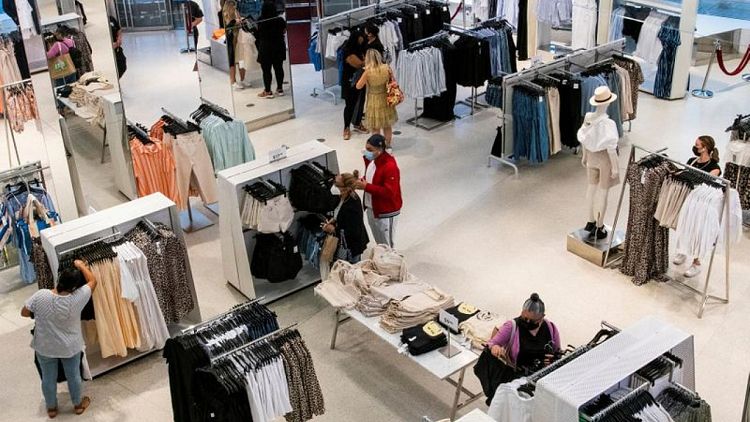By Lucia Mutikani
WASHINGTON (Reuters) - U.S. consumer confidence hovered at a 14-month high in May as optimism about job prospects tempered concerns about rising inflation and diminishing government financial support.
Though the survey from the Conference Board on Tuesday suggested the pace of economic growth remained robust in the second quarter, the recovery from the COVID-19 pandemic recession, which started in February 2020, is bumpy.
The housing market, one of the star performers, is showing signs of fatigue, with new single-family homes sales dropping in April amid a dearth of properties, which is boosting prices at the fastest pace in more than 15 years.
The Conference Board said its consumer confidence index slipped to a reading of 117.2 this month from 117.5 in April, the highest level since February 2020. Economists polled by Reuters had forecast the index at 119.2.
Effective May, the Conference Board switched to an online from a mail survey. Data from January through April was revised to reflect the results of the online survey. The dip mirrored other sentiment surveys, which were pulled down by worries that rising inflation would erode consumers' purchasing power.
Inflation is bubbling as the economy's reopening after coronavirus-related restrictions and massive fiscal stimulus unleash pent-up demand, which is pushing against supply constraints, leading to price hikes for most goods.
The survey's present situation measure, based on consumers' assessment of current business and labor market conditions, increased to a reading of 144.3 from 131.9 last month.
But the expectations index, based on consumers' short-term outlook for income, business and labor market conditions, fell to 99.1 from 107.9 in April.
Stocks on Wall Street were higher in choppy trading. The dollar slipped against a basket of currencies. U.S. Treasury prices rose.
Graphics: Consumer confidence - https://graphics.reuters.com/USA-STOCKS/jznvnrrgxvl/consconf.png
JOBS PLENTIFUL
The Conference Board survey's so-called labor market differential, derived from data on respondents' views on whether jobs are plentiful or hard to get, raced to a reading of 34.6 in May from 21.6 in April.
This measure, which closely correlates to the unemployment rate in the Labor Department's closely watched employment report, is just below its 38.3 peak in August 2019. The jump in the so-called labor market differential this month likely reflected a record 8.1 million job openings.
It offers hope that job growth picked up this month. A labor shortage is hampering job growth, even as nearly 10 million Americans are officially unemployed. The worker shortage has been blamed on generous unemployment benefits, including a weekly $300 subsidy from the government.
Lack of child care facilities, with most schools offering partial in-person learning, as well as lingering fears of the virus and pandemic-related retirements are also believed to be contributing to the worker shortage, which curbed hiring in April. The government-funded benefits, part of the $1.9 trillion pandemic relief package, expire in early September and school districts are expected to resume in-person classes in the fall, which economists hope will boost the labor pool.
The Conference Board survey showed the share of consumers expecting an increase in income over the next six months fell to 14.5% from 17.4% in April. The proportion anticipating a drop fell to 9.3% from 10.5% last month.
In a separate report on Tuesday, the Commerce Department said new home sales dropped 5.9% to a seasonally adjusted annual rate of 863,000 units last month. March's sales pace was revised lower to 917,000 units from the previously reported 1.021 million units. Monthly sales declined in the populous South, the Midwest and Northeast, but rose in the West.
Sales surged 48.3% on a year-on-year basis in April.
Graphics: New home sales - https://graphics.reuters.com/USA-STOCKS/qmypmeernpr/nhs.png
The market for new homes is being boosted by near record low inventory of previously owned houses, especially entry level homes. The pandemic has fueled demand for spacious and more expensive accommodations as millions of Americans work from home and take classes remotely.
But the virus has disrupted labor supply at saw mills and ports, causing shortages of lumber and other raw materials, limiting builders' ability to ramp up construction of new homes to plug the inventory gap. The input shortages are raising new home prices as well.
Though the Conference Board survey showed fewer people planned to buy a home over the next six months, demographics suggest the housing market will remain strong, with people between the ages of 26 and 34 accounting for about 12.5% of the U.S. population.
A third report showed the S&P CoreLogic Case-Shiller house price index rose 13.2% in March from a year ago, the largest increase since December 2005, after rising 12.0% in February.
Graphics: Home prices and home ownership - https://graphics.reuters.com/USA-STOCKS/yxmpjmmwgvr/caseshiller.png
Boiling house price inflation was underscored by a third report showing the Federal Housing Finance Agency house price index jumped a record 13.9% on a year-on-year basis in March after advancing 12.4% in February.
Economists and Federal Reserve official do not believe another housing bubble is developing, noting that the surge is being mostly driven by a mismatch between supply and demand, rather than poor lending practices, which triggered the 2008 global financial crisis.
Richmond Fed President Thomas Barkin said on Tuesday he didn't see the leverage in the housing market "going to excess levels yet."
(Reporting by Lucia Mutikani; Additional reporting by Evan Sully; Editing by Andrea Ricci)



